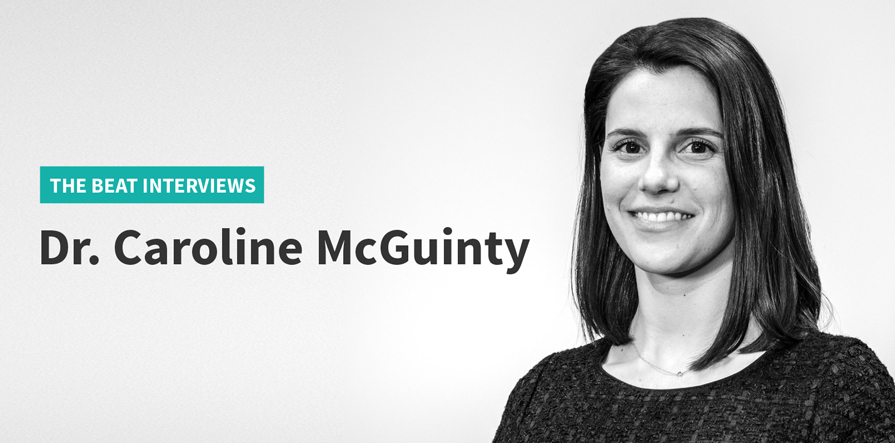
The Beat started this special column to introduce you to the brilliant minds and compassionate hearts who work at the University of Ottawa Heart Institute.
This week’s feature shines a light on one of the most recent additions to the institute’s team of cardiologists. In less than one year, Dr. Caroline McGuinty has relocated to Ottawa where she developed and launched a holistic new program that provides non-malignant palliative care to patients with end-stage heart disease.
Dr. Caroline McGuinty is the medical director of the Cardiac Supportive and Palliative Care Program at the University of Ottawa Heart Institute. What follows is a short summary of a recent interview she gave for The Beat.
The Beat: What interested you in pursuing a career as a cardiologist?
Dr. Caroline McGuinty: As a medical student, I was always interested in the heart, but it was not until my internal medicine training that I knew I wanted to be a cardiologist. The field of cardiology is an exciting one with treatments and technologies that are constantly evolving. In addition to the very interesting pathophysiology in heart disease, cardiology includes a wide range of diagnostic testing as well as medical and interventional treatment options. What I loved most was the ability to care for patients across the spectrum of acuity, from very sick in an ICU setting to stable outpatients who I could follow longitudinally. I am a specialist in heart failure, heart transplant, and palliative care. I was inspired to complete additional training in palliative care because—and this occurred to me during my cardiology training—there is a huge gap in care delivery for patients with advanced heart disease between the time it becomes clear there are no further interventions to offer from a cardiac standpoint and the end-of-life stage. I felt with the right training, I could fill this gap to improve care for these patients.
Where did you complete your studies and what are your professional certifications?
I completed medical school at the University of Ottawa—which is where I am from originally—and I completed my residencies in internal medicine and cardiology, as well as my fellowship training, at the University of Toronto. Specifically, I did my heart failure and heart transplant fellowship and my palliative care training at the University Health Network, which is part of the University of Toronto.
What are your clinical interests,and why do these subjects interest you?
I was struck by the unmet need for palliative care. I wanted to develop my expertise in palliative care so I could provide it for my heart failure patients. It is important to me that these patients have the same access to palliative care as a patient with cancer does. We know the symptom burden is very similar between heart failure patients and patients with cancer.
You work at the University of Ottawa Heart Institute. What does that mean to you?
The Heart Institute is a world-renowned centre of excellence that contributes important and innovative work across several subspecialties of cardiology. I am grateful for the opportunity to complement this work through my training and experience in a subspecialty of cardiology that has not yet been explored here.
The Heart Institute is truly a unique institution with very few comparable centres in Canada. We are focused entirely on cardiac care, which allows for innovative treatments and novel research. My colleagues are experts in what they do and for that the patients have come to trust this institution. Despite being a centre of excellence though, the Heart Institute still has a “community feel.” People here feel well-supported by others, and that feeling is palpable.
What do you hope to achieve through your work at the Heart Institute?
Firstly, I would like to grow the Advanced Heart Failure and Transplant Program with my colleagues at the Heart Institute with the aim to provide excellent care and to improve outcomes in this patient population.
Secondly, I hope to grow the Cardiac Supportive and Palliative Care Program at the Heart Institute. My hope is that through our work we can improve access to palliative care for patients across eastern Ontario and improve patients’ quality of life. Our goal is to show that, as the program grows, it can be a model of care that is easily replicable in other centres. I want to demonstrate that in addition to improving quality of life, our patients can be better supported in the community, and ultimately, I believe we may prove that they have a decreased hospitalization rate and make fewer visits to the emergency room. My hope is that our program is regarded as a model of care that can be modelled elsewhere, and that someday it becomes the standard of care for patients with advanced cardiac disease.
What is one thing you wish you could tell your patients in palliative care?
I recognize these patients are facing a difficult disease. I recognize that having a chronic illness is a real challenge for most patients, and that challenge includes not only the physical symptoms they are experiencing, but also the increasingly complex decisions that they face in their treatment plan. I believe the first thing every patient should know is that I recognize and acknowledge that they are facing these things. I want them to know that the clinic is going to support them and that they are not alone. I want them to feel supported by the medical system as they progress through their disease and that the clinic will help to quarterback their care.

